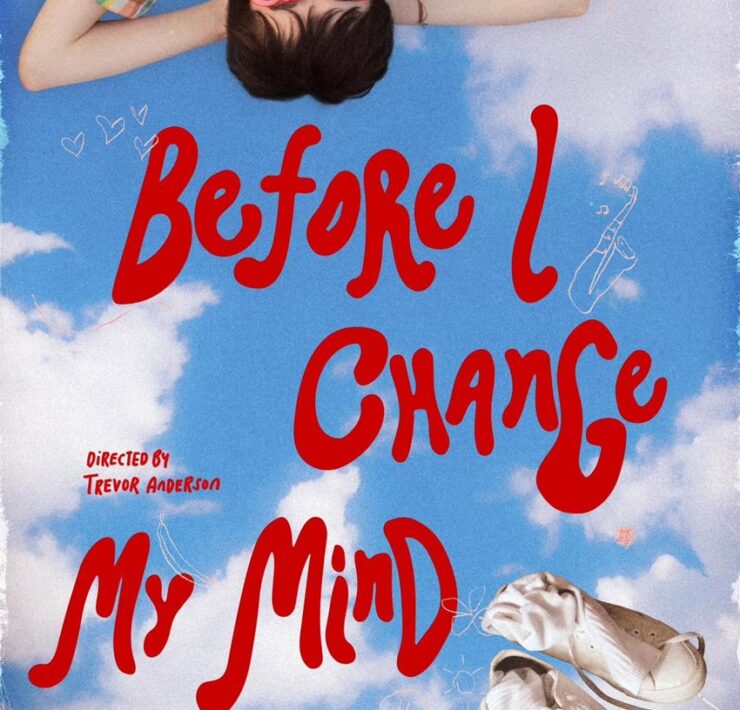Author Ginelle Testa On Her Memoir ‘Make a Home Out of You’

Ginelle Testa (she/they) is the author of the memoir Make a Home Out of You. In it, she explores her journey towards making a home out of herself. Their early life was chaotic, marked by impulsivity, eating disorders, and a desperate need to feel loved. But in her candid portrayal of her journey, we come to see her in the full capacity of what makes someone human. Her honesty may make her this generation’s Elizabeth Wurtzel or Elizabeth Gilbert, with the cultural touchstones of the times and her bared approach to her own life. Now a queer recovering addict, they do not sugar coat their mistakes, which makes the wholesome moments so much sweeter. Testa spoke with OFM about their book and the processes it took.
What inspired you to write this memoir?
I did NaNoWriMo (National Novel Writing Month) a few times. I jotted down stories with no intention to publish a memoir. I was just writing out stories, wanting to hit that word count. I got excited about telling stories and eventually I was like, wow, I have 50,000 words. I thought they were a bit patchwork but maybe I could put them together into a memoir. And so I did.
What other writers or memoirists inspire you?
Elizabeth Gilbert inspires me. I know she’s so big, but (I especially love) her Eat, Pray, Love, and some of her other books that she’s written, specifically her book Big Magic: Creative Living Beyond Fear. Same with The Artist’s Way. Those two books really inspired my journey of writing this memoir.
Throughout the book, you use that metaphor of making a home out of people and things. What is it about a home that makes it a good metaphor for your own experiences?
A home is meant to feel safe. It’s meant to feel personal. It’s meant to be individualized. You can decorate it the way you want. It’s a good metaphor because it works for both interpersonal relationships and for oneself. You can build a home with others, but you can also build a home within yourself.

There are stories you don’t write about in the book (e.g. falling in love at Fat Camp), or stories you mention in passing but don’t elaborate on (e.g. the computer monitor at Anthony). How did you decide to include the stories and narrative did, and why leave out other stories?
It was really hard to decide what went on the chopping block. I love the fat camp story, and that was originally a chapter. But I had to pick what moved the plot along and what was most relevant to that theme of making a home. I did leave out that story, which I’m bummed about. Another thing is that I got electric convulsive therapy in the middle of 2017, and that didn’t make it in the book. Make A Home Out of You is mostly about relationships, so I kept it to that theme.
My fat camp story is going to come out in other ways. I’m actually writing a fiction book about two queer people falling in love at a fat camp. They learn to love themselves and each other.
Why choose to write a memoir now versus maybe later on in life?
I had enough of a story to tell. Memoirs are thematic. I could write multiple memoirs later on in life.
I was at my book event with my editor. She was saying that Elizabeth Gilbert has written multiple memoirs about different periods in her life. She wrote a memoir about when she was married to a man. Now she’s out as queer. It doesn’t have to end there.
One thing I noticed about this book is, you begin with a younger or more childish voice, but it grows to be self reflective and aware. Was this an intentional choice? And why do you think it supports the narrative?
Yes. It was a challenging choice because it’s hard for me to put myself back into those mindsets. For example, the eating disorder. I’m very body positive now, so to put myself back in that was really challenging. I (tried to) adap my voice so readers would understand my experience. They can witness my thought process and how it evolved. It was a very specific choice.

One of the best stories, in my opinion, comes from your first acceptance of being queer early on in your college experience. But this is also preceded by one of the darkest chapters concerning your own behavior (no spoilers). Why is it important to balance these stories of light and dark in your own life?
That is the nature of human experience. We all have light and dark. I actually never considered leaving out that difficult story because it’s such an important part of the narrative. I needed to show how bad it got for me and my behavior. The light is just as important to show the connections that I made and the growth that I had. Both are equally important to show depth in a story.
Memoirs often deal with the truth of experience over the fact of the events. How does this book balance truth in facts?
My memory is the best of my ability. I did reference other people’s experiences. I talked to friends who were in those experiences. I talked to my family, and so I feel like I did the best to paint my truth. Two people can have the same experience and have two different memories of it. Some of the dialogue, for example, may have been creative nonfiction because I couldn’t remember exact dialogue. So I acknowledge that my memory is imperfect, and there’s probably things that other people experience that don’t look like mine. I just did my best to paint it as truthfully as I could.
You open your book on a moment where you are very deep into recovery but are also still struggling very hard. Why did you start here?
I wanted to show a little bit of the progress. I wanted to preview that it wasn’t gonna be all bad. I did have some resolution. I wanted to get to that first and then plot how I got there. It didn’t make sense to start right when I was 12 or 13.
You speak on your different addictions throughout the book, but you end on sex and love addiction as kind of the greatest impact on your behavior. So what makes sex and love addiction different from other addictions?
The alcohol and drugs seemed almost a symptom of the sex and love addiction, or the core wounding. I don’t even know that I identify as an alcoholic anymore. I don’t drink, but I think it was more a coping mechanism. Same with, probably, eating disorders. It is more like an offshoot of the core issue. The core wounding was my relationships. It is most difficult piece for me and the most continually challenging.
Make a Home Out of You is out now and available wherever books are sold. For more by Ginelle Testa, click here.
Photos courtesy of Ginelle Testa
What's Your Reaction?
Rachel aka Rae (they/any) has been writing since the second grade, and knew it's what they wanted to do since the third. Poet, storyteller, and avid reader.










